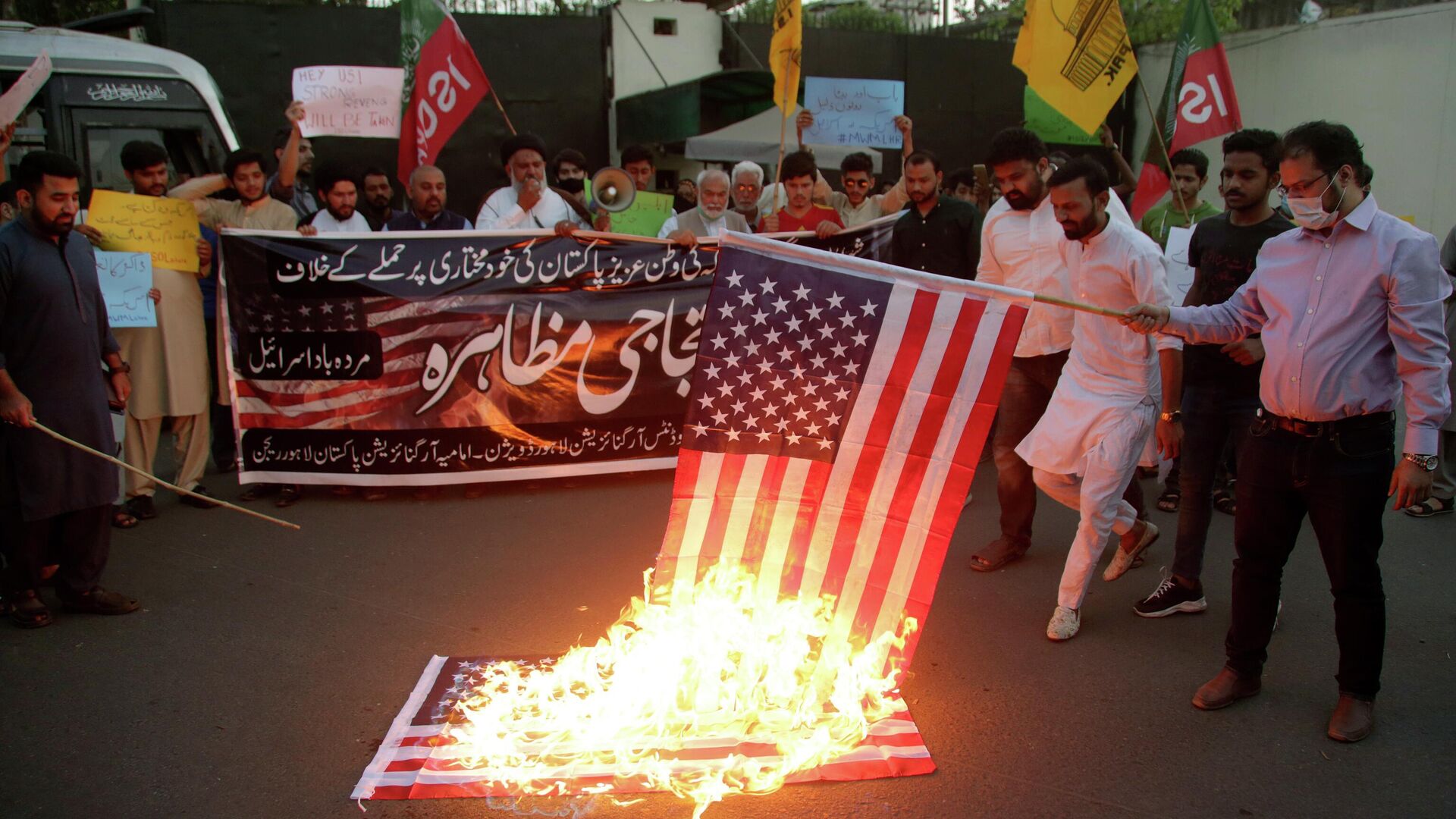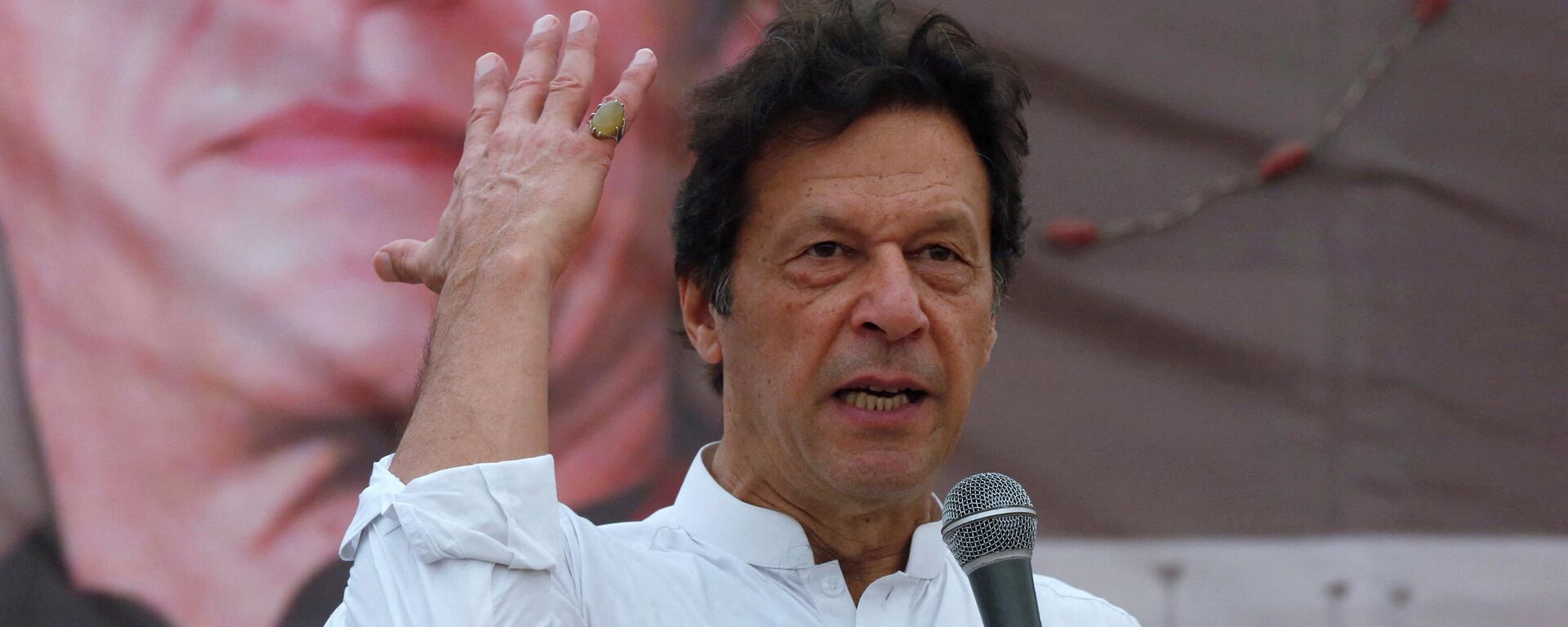https://sputnikglobe.com/20220409/us-bluntly-rejects-pakistan-pms-allegations-of-foreign-interference-ahead-of-no-confidence-vote-1094606715.html
US 'Bluntly' Rejects Pakistan PM's Allegations of 'Foreign Interference' Ahead of No-Confidence Vote
US 'Bluntly' Rejects Pakistan PM's Allegations of 'Foreign Interference' Ahead of No-Confidence Vote
Sputnik International
Pakistan’s National Assembly is set to vote on a no-confidence motion against PM Imran Khan on Saturday, who earlier suffered a major political setback as his... 09.04.2022, Sputnik International
2022-04-09T07:02+0000
2022-04-09T07:02+0000
2022-12-08T18:02+0000
imran khan
us
tehreek-e-insaf (pti)
pakistan muslim league-nawaz
foreign interference
asia
pakistan
https://cdn1.img.sputnikglobe.com/img/07e6/04/09/1094609318_0:160:3073:1888_1920x0_80_0_0_29da4a09569cccb9515bc2ea63ba4fa4.jpg
The US has "bluntly" rejected allegations of Pakistani Prime Minister Imran Khan, who on Friday evening reiterated his charge that the no-confidence motion against him was instigated by Washington."Of course, we continue to follow these developments, and we respect and support Pakistan’s constitutional process and rule of law. But again, these allegations are absolutely not true", the US official said.During his Friday address, Khan called upon the people to take to the streets in protest if there is an “imported government” in the country.“We got to know that US diplomats were meeting our people. Then we got to know about the entire plan", stated the prime minister.Prime Minister Khan has directly accused the US of instigating the no-confidence motion against him. He has accused the opposition of being “pawns” of a foreign power, an apparent reference to Washington.In a televised address on 31 March, Khan indirectly called out the US for “interfering” in Pakistan’s domestic politics.Before his address, Khan also convened a meeting of the National Security Committee (NSC), which comprises Pakistan’s political and military leadership.In the meeting, he presented “evidence” of a “foreign conspiracy” to topple his government.On 3 April, Khan named US Assistant Secretary of State for South and Central Asian Affairs Donald Lu as the individual who had met Asad Majeed, Pakistan’s ambassador to Washington, on 7 March. In the meeting, Lu warned Majeed of “consequences” if Khan survived the no-confidence motion, as per the PM.The motion was tabled in the Pakistani National Assembly the following day, on 8 March, by opposition leader Shahbaz Sharif, the leader of Pakistani Muslim League- Nawaz (PML-N).The no-confidence motion came up for voting in the National Assembly on 3 April, but deputy speaker Qasim Suri dissolved the parliament before voting could take place.Suri also rejected the no-confidence motion, paving the way for a snap election. He was acting on the advice of President Arif Alvi, who in turn follows the advice of the prime minister.Pakistan’s Supreme Court took suo motu note of Suri’s decision, with the proceedings lasting for five days before the verdict was pronounced late in the evening of 7 April.A five-judge bench of the Supreme Court headed by the Chief Justice of Pakistan unanimously declared that the deputy speaker’s decision was "unconstitutional".In its verdict, the top court also ordered the National Assembly Speaker Asad Qasier to convene a National Assembly session no later than 10:30 a.m. PST (5:30 a.m. GMT) on Saturday.
https://sputnikglobe.com/20220405/us-punishing-disobedient-imran-khan-for-his-foreign-policy-says-russian-foreign-ministry-1094494714.html
pakistan
Sputnik International
feedback@sputniknews.com
+74956456601
MIA „Rossiya Segodnya“
2022
News
en_EN
Sputnik International
feedback@sputniknews.com
+74956456601
MIA „Rossiya Segodnya“
Sputnik International
feedback@sputniknews.com
+74956456601
MIA „Rossiya Segodnya“
imran khan, us, tehreek-e-insaf (pti), pakistan muslim league-nawaz, foreign interference, pakistan
imran khan, us, tehreek-e-insaf (pti), pakistan muslim league-nawaz, foreign interference, pakistan
US 'Bluntly' Rejects Pakistan PM's Allegations of 'Foreign Interference' Ahead of No-Confidence Vote
07:02 GMT 09.04.2022 (Updated: 18:02 GMT 08.12.2022) Pakistan’s National Assembly is set to vote on a no-confidence motion against PM Imran Khan on Saturday, who earlier suffered a major political setback as his government’s strength recently fell to 164 in the 342-member house. The opposition parties, on the other hand, enjoy a combined strength of 177 lawmakers.
The US has "bluntly" rejected allegations of Pakistani Prime Minister Imran Khan, who on Friday evening reiterated his charge that the
no-confidence motion against him was instigated by Washington.
"Let me just say very bluntly there is absolutely no truth to these allegations", deputy State Department spokesperson Jalina Porter said on Friday. She was commenting on Khan’s speech to the Pakistani public late on Friday evening.
"Of course, we continue to follow these developments, and we respect and support Pakistan’s constitutional process and rule of law. But again, these allegations are absolutely not true", the US official said.
During his Friday address, Khan called upon the people to take to the streets in protest if there is an “imported government” in the country.
“We got to know that US diplomats were meeting our people. Then we got to know about the entire plan", stated the prime minister.
Pakistan's prime minister said that it would be an “insult” to the 220 million people of the country if it was “ordered” by Washington.
Prime Minister Khan has
directly accused the US of instigating the no-confidence motion against him. He has accused the opposition of being “pawns” of a foreign power, an apparent reference to Washington.
In a televised address on 31 March, Khan indirectly called out the US for “interfering” in Pakistan’s domestic politics.
Before his address, Khan also convened a meeting of the National Security Committee (NSC), which comprises Pakistan’s political and military leadership.
In the meeting, he presented “evidence” of a “foreign conspiracy” to topple his government.
On 3 April, Khan named US Assistant Secretary of State for South and Central Asian Affairs Donald Lu as the individual who had met Asad Majeed, Pakistan’s ambassador to Washington, on 7 March. In the meeting, Lu warned Majeed of “consequences” if Khan survived the no-confidence motion, as per the PM.
The motion was tabled in the Pakistani National Assembly the following day, on 8 March, by opposition leader Shahbaz Sharif, the leader of Pakistani Muslim League- Nawaz (PML-N).
The no-confidence motion came up for voting in the National Assembly on 3 April, but deputy speaker Qasim Suri dissolved the parliament before voting could take place.
Suri also rejected the no-confidence motion, paving the way for a snap election. He was acting on the advice of President Arif Alvi, who in turn follows the advice of the prime minister.
Pakistan’s Supreme Court took suo motu note of Suri’s decision, with the proceedings lasting for five days before the verdict was pronounced late in the evening of 7 April.
A five-judge bench of the Supreme Court headed by the Chief Justice of Pakistan unanimously declared that the deputy speaker’s decision was "unconstitutional".
In its verdict, the top court also ordered the National Assembly Speaker Asad Qasier to convene a National Assembly session no later than 10:30 a.m. PST (5:30 a.m. GMT) on Saturday.



